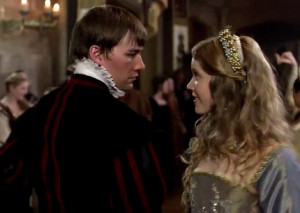 On this day in history, 10th December 1541, Thomas Culpeper and Francis Dereham were executed for their part in the fall of Catherine Howard, fifth wife of Henry VIII.
On this day in history, 10th December 1541, Thomas Culpeper and Francis Dereham were executed for their part in the fall of Catherine Howard, fifth wife of Henry VIII.
In his Chronicle, Charles Wriothesley writes:-
“Culpeper and Dereham were drawn from the Tower of London to Tyburn, and there Culpeper, after an exhortation made to the people to pray for him, he standing on the ground by the gallows, kneeled down and had his head stricken off; and then Dereham was hanged, membered, bowelled, headed, and quartered [and both] their heads set on London Bridge.” Wriothesley, Chronicle, I, p. 131
You’ve got to feel sorry for Dereham, haven’t you? His only crime was to have had a past relationship with Catherine, long before Henry VIII came on the scene, yet it was he who suffered the horrific traitor’s death – poor man!
You can read more about Thomas Culpeper in my article “Thomas Culpeper” and there is more information on Dereham, Culpeper and Catherine Howard in The Fall of Catherine Howard and The Executions of Catherine Howard, Jane Boleyn, Francis Dereham and Thomas Culpeper.
There is a clip of the execution scene from Season 4 of the Tudors at YouTube – click here – but it’s not for the faint hearted!